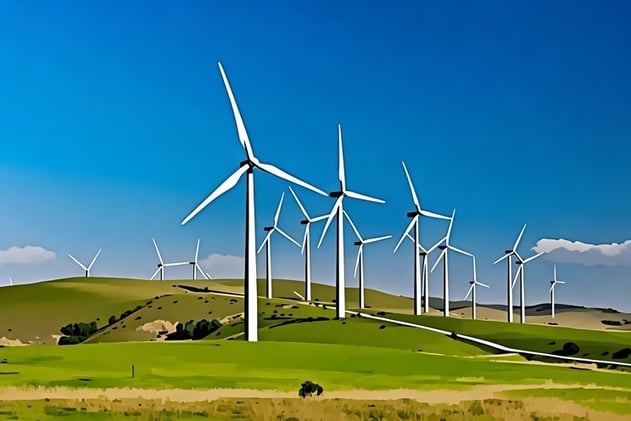- The Transition
- Topics
- Spotlight
Spotlight

Can direct air capture make a game-changing difference to carbon emissions?
While still an emerging technology, direct air capture could play an important role in the fight against climate change by removing existing carbon emissions from the atmosphere. However, it’s scalability is currently restricted by the high costs involved and amount of energy required to extract, distil and store carbon underground. Despite these limitations, both private and public investors have seen the potential direct air capture offers, and with several innovative start-ups pioneering more energy efficient solutions, the stage is set for growth.


A deep dive into desalination’s energy problem (and solutions)
With over 40% of the world’s population affected by water scarcity, the desalination industry is essential to global development. However, while it is providing clean water to more than 300 million people, the 21,000 desalination plants worldwide require huge amounts of energy, the majority of which still comes from fossil fuels. Thankfully, alternative ways of operating are emerging, with innovations ranging from harnessing renewable power sources to improving the materials used to make the process as cost-effective and energy efficient as possible.


Who were the most sustainable energy suppliers for 2024 in the UK?
With many domestic suppliers claiming to offer green tariffs, it would be easy to assume that the UK’s energy market is dominated by sustainable brands. But when you dig into the numbers and look at the companies that are going the extra mile to invest in and generate renewable energy, the field narrows considerably. The most sustainable energy suppliers in 2024 not only offered renewable tariffs but also cemented their commitment to the energy transition by actively investing in solar, wind, and biomethane.


Shining a spotlight on green steel start-ups
As one of the world’s most used materials – and with one of the largest carbon footprints – the steel industry has long been considered one of the hardest sectors to decarbonise. While more sustainable production processes are available, harnessing hydrogen and renewable energy, these are more expensive and rely on restricted resources that hinder their adoption by legacy manufacturers. However, green steel start-ups are showing that there may be another way forward – and investors are starting to see their potential.


The largest funding rounds of 2024
Looking back at 2024, investment in the renewable and cleantech sector continued to grow. While economic constraints could have dissuaded investors, funding has consistently increased since 2020 and hit record sums this year. However, looking at the companies that attracted the most significant investment in 2024 illustrates that funding is still largely concentrated within the developed world and channelled towards firms which are already relatively established, have a product with mass market appeal, and formed partnerships with big name corporations.


Decarbonising industry: Spotlight on cement
As one of the world’s largest contributors to carbon dioxide emissions, cement is a material that desperately needs to be decarbonised. Happily, there are several innovative companies making strides in green cement, adopting alternative materials and production methods as well as capturing the carbon emitted by traditional Portland Cement manufacture. With the use of cement expected to grow exponentially in the coming years, the green cement industry represents a massive environmental and economic opportunity that could transform the way the construction sector operates.


Recycling rare earth materials
With rare earth elements an essential component in everything from smartphones and laptops to electric vehicles and wind turbines, demand for these materials is set to rapidly increase as electrification grows. However, an uncertain supply chain, the high energy consumption of mining, and the vast quantities of electronic waste being produced have led many experts to look to recycling to help satisfy the increase in demand. But can these elements be recycled effectively?


The UK, wind and China
With the UK home to the perfect blend of natural resources to make wind energy a viable alternative to fossil fuels, it’s unsurprising that the Government is looking to maximise its potential – and quickly. With Scottish Power awarding Hull-based Siemens Gamesa a £1 billion contract to build turbines, growth in this industry could benefit the environment and the economy. But some are looking to outside sources to help accelerate capacity. China dominates the international wind energy supply chain, but it’s not got there without controversy. Could welcoming input from here be a short-term fix with long-term consequences?


The rise and fall of Northvolt, and what it means for Europe’s EV battery market
Once the leading light of Europe’s battery cell industry, Northvolt shocked many by filing for Chapter 11 bankruptcy in the US in November, with debts amounting to over $5.8 billion. Despite eight years of innovation, an impressive client roster and over $12 billion in funding, the company couldn’t produce the quantities needed to deliver on its commitments and has been forced to scale back. Its fall has caused a ripple effect, throwing Europe’s battery supply chain into chaos, and exposing the issues plaguing this nascent industry.


Spotlight on LEGO Group
As one of the most prolific toy manufacturers in the world, and one with a product that is reliant on plastic, the LEGO Group is facing significant challenges when it comes to operating more sustainably. However, the Danish brand has taken a proactive approach to solving this problem, looking to make more sustainable choices in its manufacturing, employee policies, and investment. Taking a holistic approach to minimising its environmental impact, the LEGO Group is proving what’s possible and setting an example for similar companies worldwide.


What is white hydrogen and why haven’t we heard more about it?
The accidental discovery of natural white hydrogen in a well in Mali, West Africa has unlocked a whole new world of possibilities for this important energy source. Free from carbon emissions and ready-made with no need for costly electrolysis, white hydrogen could be a sustainable source of energy and contribute to the 200 million tonnes of low-carbon hydrogen per annum that the world will need to decarbonise by 2050. But it’s not a silver bullet solution – indeed, there are many problems that this burgeoning sector needs to address before it can play a significant role in the renewable energy industry.


CCUS: The state of play in the UK, European and US markets
Carbon capture, storage and utilisation (CCUS) has an important role to play in helping the world reach net zero by 2050. Harnessing innovative technology, CCUS works to remove carbon emissions from the atmosphere and either store them safely underground or repurposes them as a cleaner source of energy. Its importance has been recognised globally with the UK, European and US markets all committing substantial funds to its development, encouraging a burgeoning start-up scene and establishing new CCUS clusters that can help to decarbonise industry.
